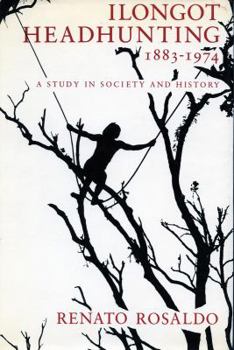Ilongot Headhunting, 1883-1974: A Study in Society and History
Select Format
Select Condition 
Book Overview
This study, a history of the kind of people who are supposed to have one, challenges the fashionable view that so-called primitives live in a timeless present. The conventional wisdom, that such... This description may be from another edition of this product.
Format:Hardcover
Language:English
ISBN:0804710465
ISBN13:9780804710466
Release Date:January 1980
Publisher:Stanford University Press
Length:313 Pages
Weight:1.58 lbs.
Dimensions:1.2" x 6.3" x 9.3"
Customer Reviews
1 rating
Losing your head over history
Published by Thriftbooks.com User , 19 years ago
The Ilongots, never a numerous people, traditionally lived in the forested mountains of central Luzon, in the Philippines. Though they may number as many as 50,000 today, most of them do not live in their traditional lands. The reasons are cultural, historical, economic, or all three. Up to the early 1970s, most Ilongots still followed what might be called a "traditional" life, though a main point of Rosaldo's work is to question that very word. The question for readers of this book is "do you really need to know very much about an obscure Philippine people ?" The answer for those who are not Southeast Asia specialists is probably "no". However, ILONGOT HEADHUNTING is not a straight-out ethnography, nor is it an exciting (titillating?) book about gruesome, exotic practices in the jungle. It is a very interesting and serious attempt to reverse the old anthropological habit of presenting small, isolated societies as if they existed in a vacuum, without history, without any influences from outside. Rosaldo wants to do away with the notion of the "timeless primitive". All peoples have history and their lives and actions definitely reflect it. Just because anthropologists did not find neat books and historical records in such places as the Ilongot mountains does not mean life never changed there. The life cycle of the individual, long a favorite focus for anthropologists, was never an "immutable structure". People's lives constantly changed from generation to generation. Rosaldo painstakingly weaves a story of clans, feuds, marriages, relationships with outsiders, and new influences to show that Ilongot history---though not remembered for much more than a century by the people---played a definite role in many aspects of their lives. In fact, they were obsessed by history. Cultural continuity and cultural homogeneity in such small groups of people who hunt and farm in remote mountains has often been taken for granted. Though Anthropology has changed drastically since the 1970s, when Rosaldo wrote the book, ILONGOT HEADHUNTING is valuable because it shows why and how history must be factored into every account of a people, no matter how remote. Rather than continuity, Ilongot history has been marked by sharp shocks and abrupt changes. Rosaldo traces the changing patterns of feuds among shifting alliances of clans, who married or fought according to numerous influences. Headhunting among Ilongots was not an exercise of "collection" as among certain other peoples. You expressed your anger and took revenge for insults or previous attacks by killing a person, cutting off their head, and throwing it away. Because of the constant change in alliances and continuous change of location due to slash-and-burn agricultural practices, and because of the turmoil of the previous 75 years, the Ilongot view of life was one of constant change. They did not expect that their children would have similar lives to theirs. Thanks to leftist guerrillas






